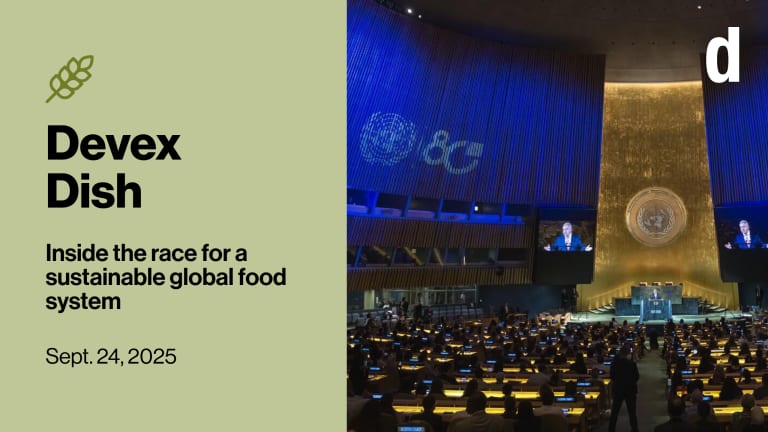
Foreign ministers from the European Union are set to meet on Monday in Brussels to discuss how the bloc can better respond to the rapidly deteriorating humanitarian crisis in the Central African Republic.
Whatever (if any) consensus comes out of the meeting, one thing is clear — a new push is needed to gather more resources to deal with the emergency.
The talks, called by EU humanitarian aid chief Kristalina Georgieva, are the latest of several attempts in the past few months to raise donors’ attention to one of the most tragic and neglected humanitarian crises around the world.
Last Friday, the U.N. Food and Agriculture Organization held an informal meeting for donor pledges, while Devex learned that the World Food Program intends to do the same in the coming days. The hope is to convince the so far reluctant donors to contribute to the $247 million U.N. Strategic Response Plan for the CAR, only 6 percent funded right now according to the latest data from the U.N. Office for Coordination of Humanitarian Affairs. At the same time, the United Nations is also expected to make further adjustments to its so-called 100 Day Plan to respond to the emergency launched last December.
“It’s a very fast-moving situation. We cannot exclude [changes]: The strength of that sort of document is that it can be adjusted,” Dominque Burgeon, director of emergencies and rehabilitation at FAO, told Devex.
Burgeon, who visited the CAR two weeks ago, offered further insights into the strategies currently being put in place to address the challenges and constraints being put on humanitarians in the country — from the urgency of being ready for the next planting season to the lack of NGOs on the ground.
A race against time for funding
The crisis in the Central African Republic, a truly failed state, is neither new nor unexpected.
While the emergency is the result of a long, profound conflict, the United Nations already believes it is taking the path of genocide, and that still has not been enough to attract the attention of the international aid community.
“There were already humanitarian appeals. But this emergency situation has not even been forgotten, it has been ignored, simply”, said Burgeon.
Regardless the magnitude of the crisis, the CAR simply has not been on the top of donors’ agendas for a long time, and funds are scarce despite the fundraising campaign initiated last December even before the resignation of President Michael Djotodia.
On Friday, FAO asked donors for $39 million to restore agricultural production for 150,000 households. That however is the tip of the iceberg regarding pledges, so the question is: Which nations will contribute more after the recent meetings? Not easy to say, according to Burgeon, who hopes the United States, Italy and above all former colonial master France will step up to the plate this time.
“Of course, France is there. France is definitely doing a great job and it will contribute because … [it] really wants the country back on its feet,” said the FAO official.
Challenges
In December, Medicines sans Frontiers complained about “unacceptable performance” from U.N. agencies responding to the CAR emergency, and demanded they deploy more staff on the ground and direct more funds to the country.
Burgeon said the first request has been met. For instance, FAO is opening new offices in tje country, where the organization currently has ten expat aid workers and about 40 locals.
Another big problem is the lack of NGOs on the ground, which hampers the effectiveness of the response because not enough humanitarians are available to deliver the assistance where it is needed.
“There are not enough NGOs in the country. We need more to come in, for all sectors. WFP has the same problem,” Burgeon said, adding that one solution could be to build the capacities of aid groups already present — without having to call back those which pulled out due to rampant insecurity.
Agriculture recovery key to food security
The U.N. Multi-Cluster Initial Rapid Assessment released last week includes food security among its top priorities for the Central African Republic, where up to 78 percent of the population needs agricultural assistance and 94 percent actually believe it’s the most urgent need.
This is particularly crucial as the planting season approaches.
As many farmers have been displaced and their stocks, tools and equipment looted, a “hunger gap” is anticipated by FAO, while WFP has talked about a 90 percent shortfall in some food supplies this month. That’s why Burgeon said it’s crucial to help agricultural production recover before the planting season and thus avoid a famine.
“If we don’t [do this in] time, WFP will [have to put in place] a huge operation for distribution of food assistance, for one year. And the bill will be huge. I’m afraid [that supporting] agriculture is the only option to feed people,” he stressed.
Not only that — it will also bring peace.
“Agriculture is the only livelihood option [for most people in the CAR]. The moment you go back to your field working on producing food for your family, de facto you bring peace, because you are focused on production,” added Burgeon.
Read more development aid news online, and subscribe to The Development Newswire to receive top international development headlines from the world’s leading donors, news sources and opinion leaders — emailed to you FREE every business day.








